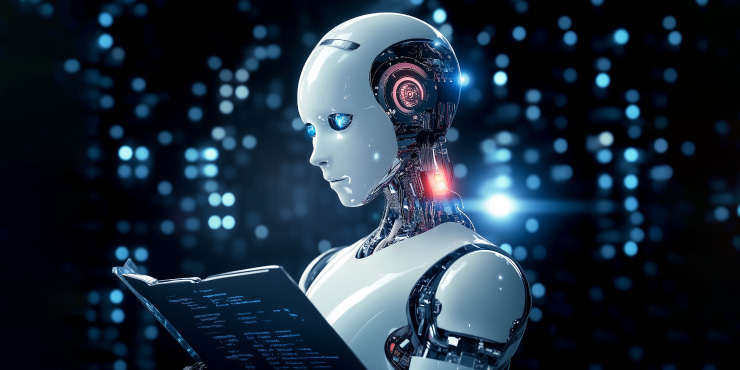Exploring the Benefits and Future of AI in Education: How Artificial Intelligence Transforms Learning Environments

The field of education has always undergone many changes. Artificial intelligence (AI) has made a significant contribution. It transforms traditional learning environments into more dynamic, personalized spaces. Why is AI good for education? Its integration offers several significant benefits. AI-powered tools can tailor learning experiences to individual students' needs. They can adapt content and instructional methods to optimize engagement and understanding. This personalization helps address diverse learning styles and paces. It makes education more inclusive and effective. AI also enhances accessibility. It breaks down barriers for students with disabilities. This is achieved through adaptive technologies and support systems.
AI-driven analytics provide educators with valuable insights into student performance. It allows for more informed and timely interventions. AI is making education more responsive, equitable, and efficient, paving the way for a future where learning is customized and accessible to all. AI continues to evolve. Its role in education is expanding. It promises even more significant innovations in creating customized learning experiences. AI will offer broadening educational opportunities for learners globally.
Enhancing Personalized Learning Through AI
AI is revolutionizing personalized learning in education. It happens through various impactful methods. Here’s how AI in online education is advancing the field:
- Intelligent Tutoring Systems: They provide real-time, personalized feedback and support. It helps students understand and retain information better by addressing specific learning gaps.
- Predictive Analytics: AI analyzes student data. It helps to predict performance trends and identify potential challenges. AI allows educators to intervene early and offer additional support.
- Adaptive Learning Platforms: AI algorithms adjust content pace based on individual student performance. It makes learning more tailored and effective. How is AI good for education? It ensures that students receive material suited to their unique needs.
- Customized Learning Paths: AI creates individualized plans. They align with each student's strengths, weaknesses, and interests. AI fosters more engaging and relevant learning experiences.
- Automated Administrative Tasks: By automating grading and scheduling, AI frees educators. They focus more on personalized instruction and student interaction.
- Virtual Classrooms and AI Tutors: AI enhances virtual learning environments. They provide interactive AI tutors and chatbots. They offer support outside of traditional class hours. These tools help maintain student engagement and provide assistance whenever needed. It makes learning more accessible and flexible.
Tailored Educational Experiences
AI algorithms are crucial in providing customized learning experiences. They analyze student data to adapt educational content to individual needs. Here’s how AI achieves this:
| Aspect | Explanation |
| Data Collection | AI collects extensive data on students’ performance. It includes test results, interaction patterns, and time spent on tasks. |
| Learning Speed Adaptation | Why should AI be used in education? Algorithms adjust the difficulty and pacing of lessons based on each student's learning speed. They ensure they master concepts before moving on. |
| Style Adaptation | AI identifies students' preferred learning styles (visual, auditory, kinesthetic). It adapts instructional materials accordingly. |
| Real-time Feedback | AI provides instant feedback on assignments and quizzes. It helps students understand mistakes and learn more effectively. |
| Personalized Learning Paths | AI creates customized learning paths by analyzing individual progress and preferences. AI offers tailored resources and activities to address specific needs. |
| Predictive Analytics | AI predicts potential areas of struggle based on data trends. It allows for proactive intervention and support. |
Continuous Assessment and Feedback
AI tools are revolutionizing the approach to assessment and feedback in education. They provide real-time insights that enhance teaching and learning experiences. Here’s how they contribute:
- Adaptive Learning: AI algorithms track student performance continuously. They adapt learning materials and strategies based on real-time data. This allows students to adjust their study habits and focus areas. It optimizes their learning efficiency.
- Performance Analytics: AI tools generate detailed performance reports, highlighting strengths and weaknesses. Educators can use these insights. They identify areas where students struggle and tailor their instructional approaches accordingly.
- Instant Feedback: AI-powered platforms deliver immediate feedback on assignments, quizzes, and tests. This rapid response helps students understand and correct mistakes promptly. It fosters a more dynamic learning process. Education and intelligence are seamlessly integrated, ensuring that learners receive timely guidance.
- Personalized Recommendations: AI systems suggest additional resources or practice exercises. They are generally based on individual performance data. AI systems help students effectively address gaps in their understanding.
- Engagement Tracking: AI can alert educators to students by monitoring engagement levels. They may be disengaging or facing difficulties, enabling timely intervention.
AI's Role in Expanding Access to Education

AI-powered educational platforms and tools remove geographical and physical barriers. Thus, they expand access to learning opportunities globally. Here's how AI helps in education:
- Remote Learning Capabilities: AI provides virtual classrooms and interactive learning experiences. They are accessible from anywhere. This flexibility allows remote or underserved students to participate in high-quality education. They may need physical infrastructure to do it.
- Personalized Learning Experiences: AI-driven platforms offer customized content and adaptive learning paths. They allow students from diverse backgrounds and locations to receive education. It is generally tailored to their needs and learning styles.
- Language Translation: AI tools facilitate real-time language translation. They break down language barriers. AI tools enable non-native speakers to access academic resources and participate in global learning communities.
- Resource Accessibility: AI-powered search engines and content recommendations make academic resources. Textbooks, research papers, and multimedia materials become readily accessible to learners worldwide. It is regardless of their geographical location.
- Virtual Tutoring and Support: AI-based virtual tutors and chatbots provide 24/7 assistance. They offer help and guidance to students in different time zones and regions. Thereby extending educational support beyond traditional classroom hours.
AI's impact on education significantly broadens access to learning through these advancements. It ensures that quality education is available to learners. This is regardless of location or physical constraints.
Streamlining Administrative Tasks with AI
AI is transforming the administrative landscape of education. It automates routine tasks. This allows educators to focus more on teaching and interacting with students. AI streamlines administrative tasks in the following ways:
- Scheduling Automation: AI systems organize class timetables, coordinate exams, and manage room assignments. They reduce administrative burdens and minimize scheduling conflicts.
- Student Admissions: AI streamlines the admissions process. It automates application reviews, sorting and ranking candidates, and managing communications. This accelerates decision-making and improves the efficiency of enrollment procedures.
- Record-Keeping: AI automates the maintenance of student records. They are grades, attendance, and personal information. This reduces the risk of errors and ensures that data is up-to-date and easily accessible.
- Communication Management: AI tools send students and parents reminders, notifications, and updates. This ensures consistent and timely information dissemination.
- Data Analysis: AI analyzes large volumes of administrative data to generate insights. They are trends in student performance and resource utilization. AI helps institutions make informed decisions.
- Resource Allocation: AI optimizes the faculty assignments and budgeting. It analyzes needs and usage patterns, enhancing operational efficiency.
These applications highlight the benefits of artificial intelligence in education. They illustrate how it can enhance administrative efficiency. Such applications also allow educators to dedicate more time to teaching and student engagement.
The Future of AI in Educational Curriculum Development
AI-driven education platforms will revolutionize curriculum development. They will make it more dynamic and responsive to emerging needs. Here’s how AI in education could shape curriculum development:
- Personalized Content: AI can tailor curriculum materials. Based on individual student needs and performance data, AI creates customized learning experiences that address specific strengths and weaknesses.
- Real-Time Updates: AI education platforms can continuously analyze new research and industry trends. They also may examine educational standards to update curricula in real time. It helps to ensure that educational content remains current and relevant.
- Predictive Analytics: AI uses it to foresee future educational trends and skill requirements. It helps educators design curricula. This prepares students for upcoming challenges and job market demands.
- Integration of Emerging Technologies: AI can integrate new methodologies into the curriculum. This is virtual reality (VR) or augmented reality (AR). It helps to enhance interactive learning and practical application.
- Feedback-Driven Adjustments: AI collects and analyzes feedback from students and educators. It helps to refine and improve curricula continually. This makes adjustments based on real-world effectiveness and user experience.
- Cross-Disciplinary Integration: AI can facilitate the development of interdisciplinary curricula. It identifies connections between different subjects. AI incorporates them into a cohesive learning framework.
- Personalized Curriculum Design: AI can design customized learning experiences. It tailors curriculums to individual student needs and preferences. AI education platforms can customize content and resources. They analyze students' learning styles, strengths, and areas for improvement. AI enhances engagement and effectiveness.
- Global Best Practices: AI platforms can analyze curriculums from various educational institutions worldwide. They may identify international best practices and successful teaching methods. This allows for the incorporation of diverse and effective strategies into local curriculums.
The future of AI in education holds the promise of creating dynamic and responsive curriculums. They evolve with emerging needs and real-world applications. Educational institutions should leverage AI to ensure their curriculums are continuously updated, personalized, and optimized. It will help them meet the demands of a rapidly changing world.


